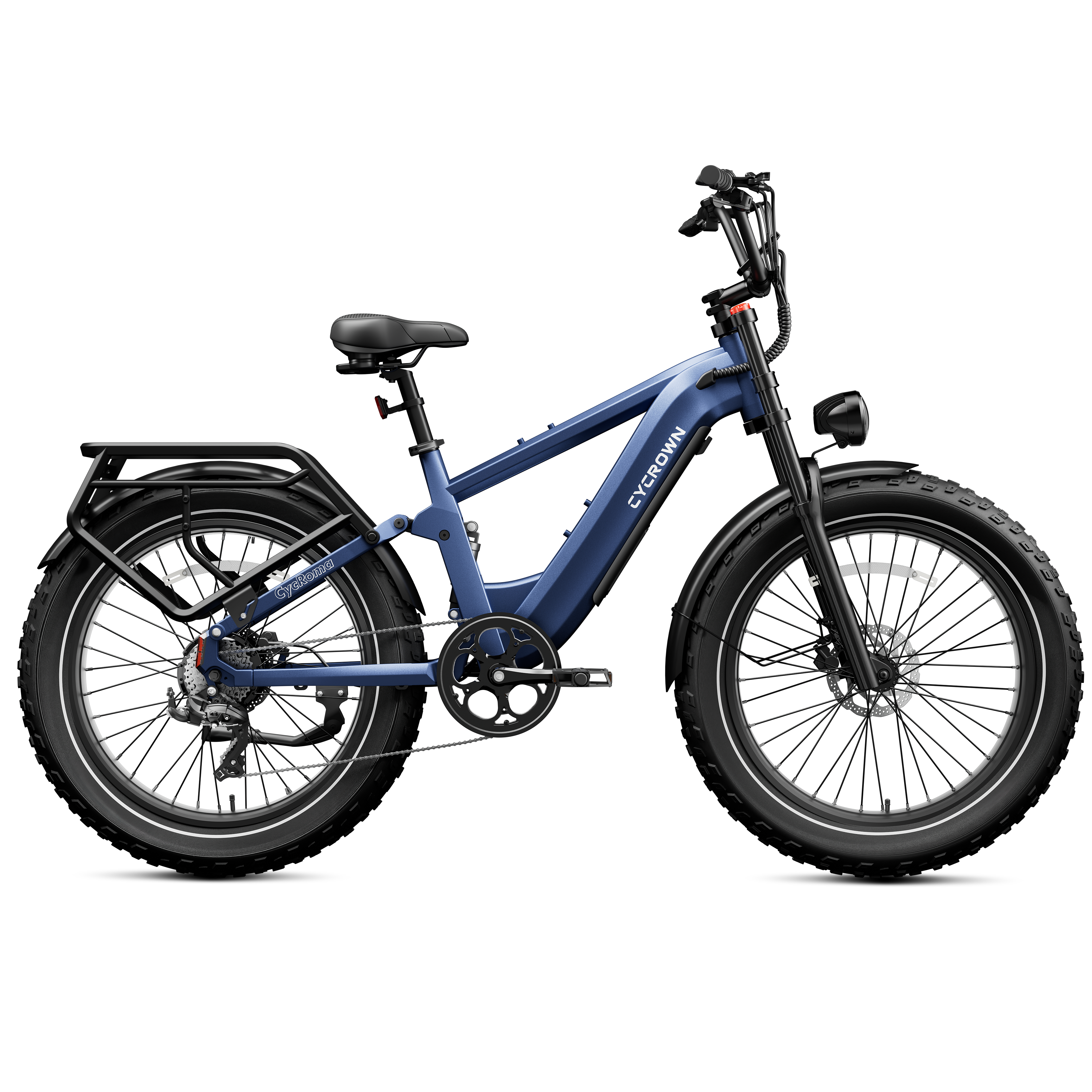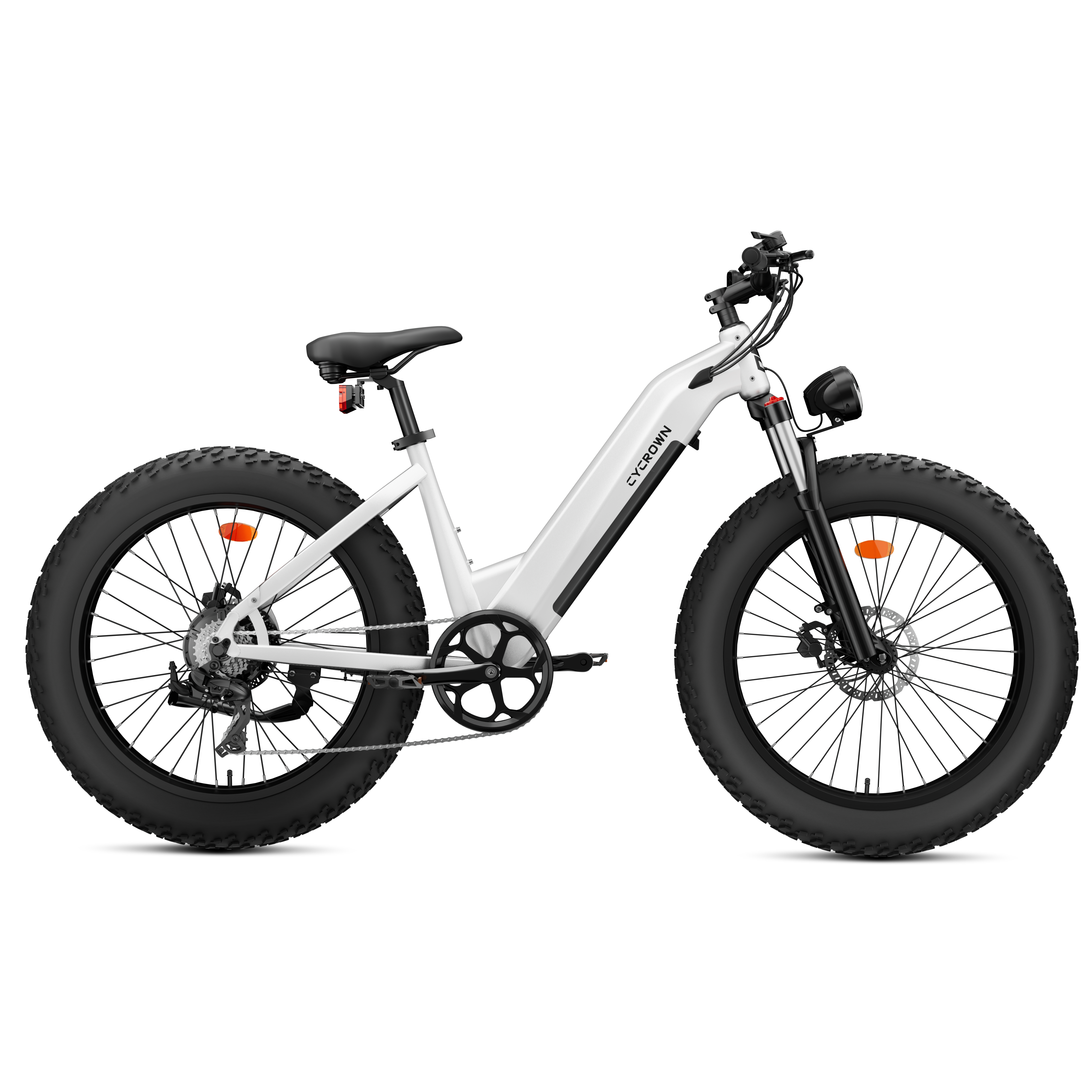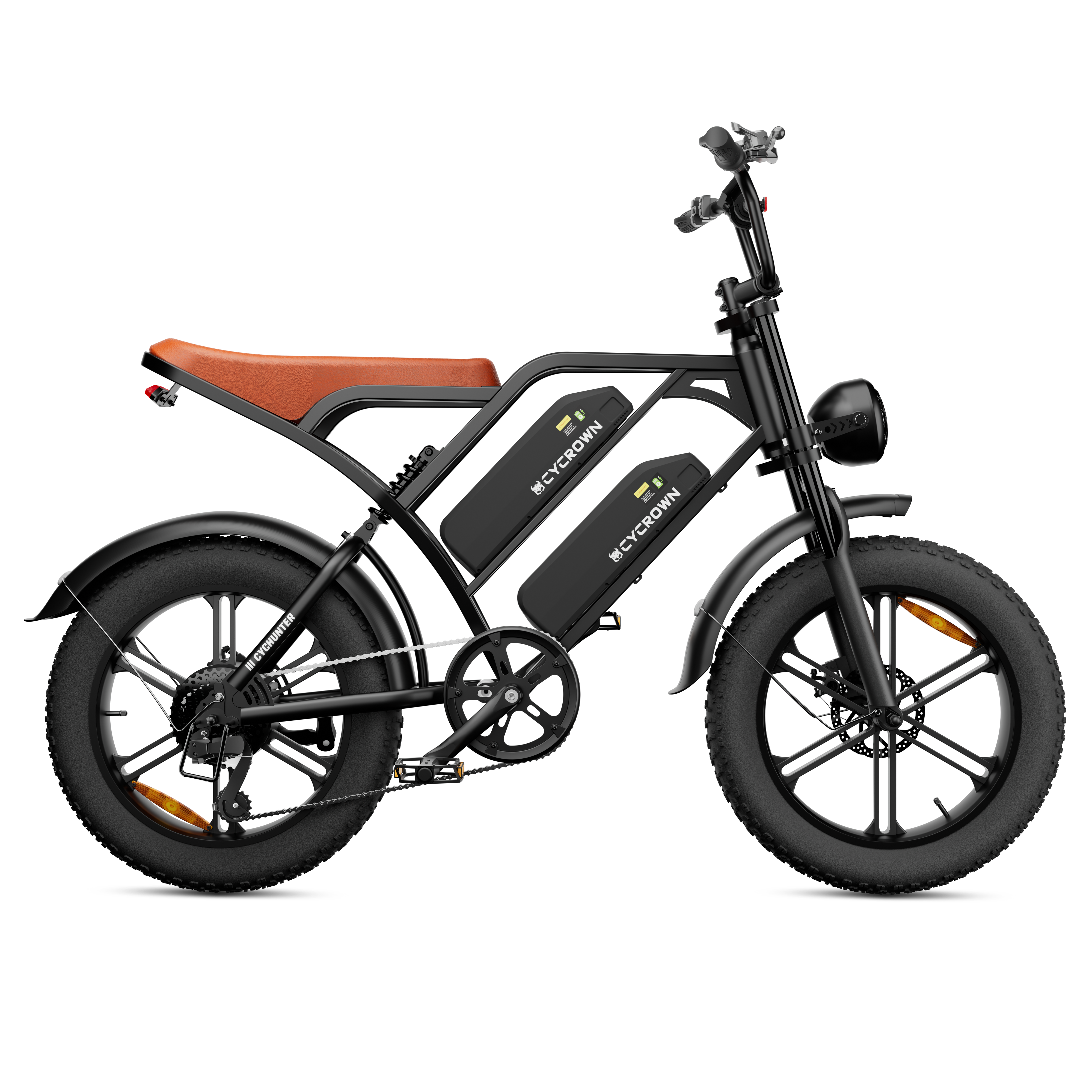When it comes to choosing between an ebike vs motorcycle, there are several factors to consider. Both have their pros and cons and ultimately, the decision depends on your personal preferences and needs.
One of the most significant differences between ebikes and motorcycles is their power source. Ebikes are electrically powered and rely on a rechargeable battery, while motorcycles use gasoline or diesel fuel. This difference has a significant impact on the cost of operating each vehicle, as well as their environmental impact. If you're looking for a more eco-friendly option, an ebike may be the better choice.
In this article, we will explore the main differences between ebikes and motorcycles to help you make an informed decision.
Understanding Ebikes vs. Motorcycles
Electric bikes, also known as e-bikes, are bicycles equipped with an electric motor that assists the rider when pedaling. They are powered by rechargeable batteries and can reach speeds of up to 20 mph. E-bikes are designed to be more versatile and accessible than electric motorcycles. They are less regulated because they resemble traditional bikes, making them more suitable for casual riders, hobbyists, exercise buffs, and shorter commutes.
Motorcycles, on the other hand, are vehicles that are powered by a motor and can reach speeds well over 100 mph. They are designed for high-speed riding over longer distances and are suitable for those who want to enjoy a higher level of speed while riding. Motorcycles are regulated more strictly than e-bikes because of their speed and power.
The Mechanics: Motor and Power
The main difference between electric bikes vs motorcycles is the motor and power. E-bikes have a smaller electric motor that assists the rider when pedaling. The motor is usually located in the hub of the rear wheel or the bottom bracket of the bike frame. E-bikes are powered by rechargeable batteries that can be charged using a standard electrical outlet.
Motorcycles, on the other hand, have a larger motor that is capable of producing more power. The motor is usually located in the frame of the motorcycle and is powered by gasoline. Motorcycles have a transmission system that allows the rider to shift gears and control the speed of the bike.
Design and Comfort Considerations
When it comes to design and comfort, electric bikes and motorcycles have different features. E-bikes are designed to be more comfortable and user-friendly. They have a more upright riding position, wider seats, and wider tires that provide more stability and control. E-bikes are also equipped with features such as lights, fenders, and racks that make them more practical for commuting and running errands.
Motorcycles, on the other hand, are designed for speed and performance. They have a more aggressive riding position, narrow seats, and thinner tires that provide more agility and maneuverability. Motorcycles are also equipped with features such as fairings, windshields, and saddlebags that make them more suitable for longer rides and touring.
Cost Comparison

When it comes to cost, electric bikes (ebikes) and motorcycles differ in several aspects.
Here is a breakdown of the cost comparison between the two:
1. Initial Purchase Price
The initial purchase price of an ebike is generally lower than that of a motorcycle. Depending on the model, ebikes can range from a few hundred to a few thousand dollars. On the other hand, motorcycles can cost anywhere from a few thousand to tens of thousands of dollars.
2. Maintenance Costs
Maintenance costs for ebikes are generally lower than those for motorcycles. Ebikes have fewer moving parts and require less maintenance. Additionally, ebikes do not require oil changes or regular tune-ups like motorcycles do. However, both ebikes and motorcycles may require occasional repairs.
3. Fuel vs. Electricity Costs
Electricity costs to charge an ebike are significantly lower than the fuel costs to power a motorcycle. Ebikes can be charged using a standard electrical outlet and can cost just a few cents per charge. In contrast, motorcycles require gasoline, which can be expensive and can vary depending on the location and current market prices.
Overall, ebikes are generally more cost-effective than motorcycles in terms of initial purchase price, maintenance costs, and fuel/electricity costs. However, the specific cost comparison between the two will depend on the model and usage of the vehicle.
Performance and Usability
When it comes to performance and usability, electric motorcycles generally offer higher speeds and more powerful acceleration compared to electric bikes. Electric motorcycles can reach highway speeds, with some high-performance models capable of exceeding 100 mph. In contrast, electric bikes are typically designed for lower speeds, generally ranging from 15 to 28 mph.
The power and speed of electric motorcycles come at a cost, however. They require larger batteries and more electricity to operate, making them less efficient and sustainable compared to electric bikes. Electric bikes, on the other hand, are more eco-friendly and cost-effective due to their smaller batteries and lower power consumption.
E-Bicycle vs. Motorcycle Range
In terms of range, electric motorcycles have the advantage due to their larger batteries. They can travel longer distances without needing to be recharged. However, this also means that they take longer to charge compared to electric bikes. Electric bikes can be charged in as little as 2-3 hours, while electric motorcycles can take up to 8 hours or more.
When it comes to torque, electric motorcycles also have the upper hand. They have larger motors that can produce more torque, allowing for faster acceleration and better performance in hilly terrain. Electric bikes, on the other hand, have smaller motors and are not as well-suited for steep inclines.
Legal Requirements and Licensing

When it comes to legal requirements and licensing for operating an e-bike or motorcycle, there are several factors to consider. In this section, we will compare the licensing requirements, age restrictions, and other legal considerations for operating e-bikes and motorcycles in different regions.
1. Licensing and Registration Requirements
In most regions, e-bikes do not require a license or registration to operate. However, there may be certain restrictions on the type of e-bike that can be used on public roads. For example, in some regions, e-bikes with a motor output of more than 750 watts may be classified as mopeds or motorcycles and require a license and registration.
On the other hand, motorcycles require a valid driver's license and registration to operate. The type of license required may vary depending on the size and power of the motorcycle. In some regions, there may be additional requirements, such as completing a motorcycle safety course or passing a written and practical test.
2. Safety Features and Gear
Both e-bikes and motorcycles require certain safety features and gear to be worn while operating. In most regions, helmets are mandatory for motorcycle riders, and in some regions, they may be required for e-bike riders as well. Other protective clothing, such as gloves, jackets, and boots, may also be required for motorcycle riders.
E-bike riders may not be required to wear as much protective gear as motorcycle riders, but it is still recommended for safety reasons. In addition to helmets, riders should consider wearing reflective clothing, gloves, and closed-toe shoes.
3. Traffic Laws and Regulations
E-bikes and motorcycles are subject to different traffic laws and regulations. In most regions, e-bikes are allowed to use bike lanes and paths, but may not be allowed on sidewalks or certain roads. Motorcycles, on the other hand, are typically required to use the same lanes as cars and may not be allowed on bike paths or sidewalks.
Safety: Electric Bikes vs. Motorcycles
When comparing electric bikes to motorcycles, safety is a major concern. Both types of vehicles have their unique safety risks, and it's important to understand them before making a decision.
1. Accident Statistics
According to the National Highway Traffic Safety Administration (NHTSA), motorcycle riders are about 28 times more likely to die in a crash than passenger vehicle occupants. However, electric bikes are generally considered to be safer than motorcycles due to their lower speeds and more stable design.
It's important to note that while electric bikes are generally safer than motorcycles, accidents can still happen. It's important to wear proper safety gear and follow all traffic laws to minimize the risk of injury.
2. Required Safety Gear
Both electric bikes and motorcycles require riders to wear certain safety gear. For electric bikes, a helmet is the most important piece of safety gear. It's also a good idea to wear reflective clothing to increase visibility, especially when riding at night.
For motorcycles, the required safety gear varies by state but typically includes a helmet, eye protection, and protective clothing such as a jacket, pants, and boots. Some states also require gloves and reflective clothing.
It's important to invest in high-quality safety gear to ensure maximum protection in the event of an accident.
Remember, safety should always be a top priority when riding any type of vehicle.
E-Bikes vs. Motorcycle Pros and Cons

If you're considering using an electric bike or a motorcycle for your daily commute, you should weigh the pros and cons of each option. Here are some advantages and disadvantages of both:
E-Bikes
Pros
- E-bikes are more affordable than motorcycles.
- They require less maintenance than motorcycles.
- E-bikes are more environmentally friendly than motorcycles.
- E-bikes are easier to park and store than motorcycles.
- E-bikes are more accessible to people who don't have a motorcycle license.
Cons
- E-bikes have a limited range, typically between 30-50 miles.
- E-bikes are slower than motorcycles, with a top speed of around 20-28mph.
- E-bikes may not be suitable for longer commutes or hilly terrain.
- E-bikes may not offer enough protection in case of an accident.
Motorcycle

Pros
- Motorcycles are faster than e-bikes and can reach higher speeds.
- Motorcycles have a longer range than e-bikes.
- Motorcycles offer more protection in case of an accident.
- Motorcycles can handle hilly terrain and longer commutes.
Cons
- Motorcycles are more expensive than e-bikes.
- Motorcycles require more maintenance than e-bikes.
- Motorcycles are less environmentally friendly than e-bikes.
- Motorcycles require a motorcycle license to operate.
- Motorcycles can be more difficult to park and store than e-bikes.
Lifestyle Considerations: E-Bicycle or Motorcycle?
When it comes to choosing between an e-bicycle and a motorcycle, lifestyle considerations play a crucial role. Your choice will depend on your needs and preferences. Here are some factors to consider:
1. Urban Commuting
If you live in a crowded city and need to commute daily, an e-bicycle may be a better option. E-bikes are lightweight, easy to maneuver, and can easily navigate through traffic. They are also less expensive than motorcycles and require less maintenance. Additionally, e-bikes are eco-friendly and help reduce your carbon footprint.
2. Long-Distance Travel
If you plan to travel long distances, a motorcycle may be a better option. Motorcycles are designed for long rides and provide better comfort and stability. They also have larger fuel tanks and can cover more miles on a single tank. However, e-bikes with larger batteries can also cover long distances, but you will need to plan your route carefully to ensure that you have access to charging stations.
Also check out: Long Range E-Bikes
3. Leisure Activities
If you enjoy leisurely rides and exploring nature, an e-bicycle may be a better option. E-bikes are quiet, eco-friendly, and allow you to enjoy the scenery without disturbing the environment. They are also easier to park and store than motorcycles. However, if you prefer the thrill of speed and adventure, a motorcycle may be a better option.
Conclusion
In summary, the choice between an e-bicycle and a motorcycle depends on your lifestyle and needs. If you need a vehicle for daily commuting and short trips, an e-bike may be a better option. If you plan to travel long distances or enjoy adventure rides, a motorcycle may be a better option.
Here's a table that compares some of the key differences between electric bikes and motorcycles:

If you're looking for a vehicle that's more environmentally friendly, easier to maintain, and less expensive, an electric bike might be the better choice for you. On the other hand, if you prioritize speed, power, and longer range, a motorcycle might be the way to go.
Ultimately, the decision comes down to your personal preferences and intended use. Consider what you'll be using the vehicle for, how often you'll be riding it, and what kind of terrain you'll be covering. With this information in mind, you can make an informed decision about whether an electric bike or a motorcycle is the right choice for you.
Ready to get an ebike? Explore Cycrown Ebikes to find your perfect fit and reach out for personalized assistance in making the best choice for you!
Frequently Asked Questions
Is riding an ebike like a motorcycle?
Riding an ebike is similar to riding a motorcycle in some ways, but there are also some differences. For example, ebikes have pedals and can be ridden like a regular bicycle, while motorcycles do not have pedals and require more skill to operate. Additionally, ebikes are typically slower and less powerful than motorcycles, which can make them a safer and more accessible option for many riders.
Why are Ebikes not motorcycles?
Ebikes are not considered motorcycles because they have pedals and do not exceed certain speed and power limits. In most places, ebikes are classified as bicycles and are subject to the same rules and regulations. However, it is important to check your local laws and regulations to ensure that you are riding your ebike legally and safely.
Is it easy to ride electric motorcycle?
Riding an electric motorcycle can be easy or challenging depending on your experience and skill level. Like any vehicle, electric motorcycles require practice and experience to operate safely and effectively. However, many riders find that electric motorcycles are easier to ride than traditional motorcycles because they have fewer moving parts and are generally more intuitive to operate.
Do you still get exercise on an ebike?
Yes, you can still get exercise on an ebike. While ebikes have an electric motor that can assist you with pedaling, you can also choose to pedal without assistance if you want to get more of a workout. Additionally, many riders find that ebikes allow them to ride longer distances and tackle more challenging terrain, which can provide a more intense workout than a traditional bike.
Is an electric bike better than a bike? At what point is an ebike a motorcycle?
Whether an electric bike is better than a traditional bike depends on your needs and preferences. Ebikes can be a great option for commuters, recreational riders, and anyone who wants to ride longer distances or tackle more challenging terrain. However, they are generally more expensive than traditional bikes and require more maintenance. As for when an ebike becomes a motorcycle, this depends on the specific laws and regulations in your area. In most places, ebikes are classified as bicycles if they meet certain speed and power limits, but it is important to check your local laws to ensure that you are riding your ebike legally and safely.










